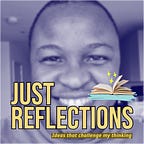In early 2022, I was introduced to the captivating world of storytelling through a TED talk by Matthew Dicks. His mesmerizing presence led me to explore his work further and eventually discover his book, Storyworthy. It was there that I first learned about The Moth, a storytelling platform that showcases ordinary people sharing extraordinary stories. The Moth's powerful ability to forge connections and provoke deep reflection on our own lives resonated with me.
This past Sabbath, I was immersed in a simple yet profound experience that echoed the power of storytelling and the beauty of human connection. Our community of friends in London had gathered for what is quickly becoming a cherished tradition: 'dombolo ministries.' Inspired by 'Jollof Ministries,' an event hosted by friends we met at Parkside Community Church in Reading, dombolo ministries is a potluck-style gathering where we share dishes from our respective home countries and connect with one another through our life stories.
Yesterday's gathering stood out as it was larger than our first and featured dedicated time for sharing personal stories. As we listened to each other's experiences, I was struck by the uncanny similarities between our individual journeys. Despite our different backgrounds, we had all faced similar struggles, victories, and divine interventions. This realization led me to three powerful insights.
First, we are all far more alike than we realize. We often feel alone in our struggles and believe that life is singling us out, while others seem to glide through unscathed. However, as we shared our stories, it became clear that each of us had faced similar challenges and triumphs. Life presents hardships and breakthroughs to all of us.
Second, storytelling is an incredibly powerful tool for revealing our shared humanity. As we connected through our shared experiences, we discovered that we were not alone, and our lives were intertwined in ways we never could have imagined. Storytelling also inspires more stories. Initially, some people were hesitant to share, but as others opened up, everyone began to see themselves in those stories and felt encouraged to contribute their own. By the end of the day, our problem was an abundance of stories, not a scarcity.
Third, storytelling has the power to overcome divisiveness. When we approach complex issues through personal narratives, we create a space for common ground and genuine listening. Stories break down barriers, establish connections, and shift the focus to similarities rather than differences.
As we reluctantly parted ways, I couldn't help but feel a sense of warmth and belonging. We had come together as a community and discovered our shared humanity through the power of storytelling. This realization strengthened and comforted me, especially considering that we, as a group of millennials, were able to be fully present and engaged without the distraction of technology. People pretty much forgot their phones the whole afternoon.
Looking ahead, I am excited to see how dombolo ministries will evolve in the coming months and years. Having experienced loneliness in London, especially during the pandemic, I am grateful for this safe haven that protects us from isolation. The magic of dombolo ministries lies not just in the amazing food we share, but in the connections we’re forging and the stories we tell. It's a safe space where we can be vulnerable, authentic, and truly understand our shared humanity, which brings us closer and empowers us to support each other through life's challenges and celebrate each other's successes.
If you have never experienced something like this, I encourage you to find your community or create your own 'pasta' or 'sushi' ministries. Something to be a safe space for connection, vulnerability, and storytelling. In doing so, you will discover the power of our shared humanity and the incredible bonds that form when we come together to share our lives with one another.
Allow me to conclude with this: The term "Ubudlelwano" in my language, Ndebele, refers to a relationship, fellowship, or connection between people. It signifies the bond and interaction that individuals share with one another, emphasizing the importance of social connections and unity within a community. Interestingly, this term is derived from the word "Ukudla," which means food. Thus, a loose direct translation of "ubudlewano" is eating together. Eating together fosters relationships, fellowship, and connection. My ancestors demonstrated remarkable wisdom when they crafted the language.









